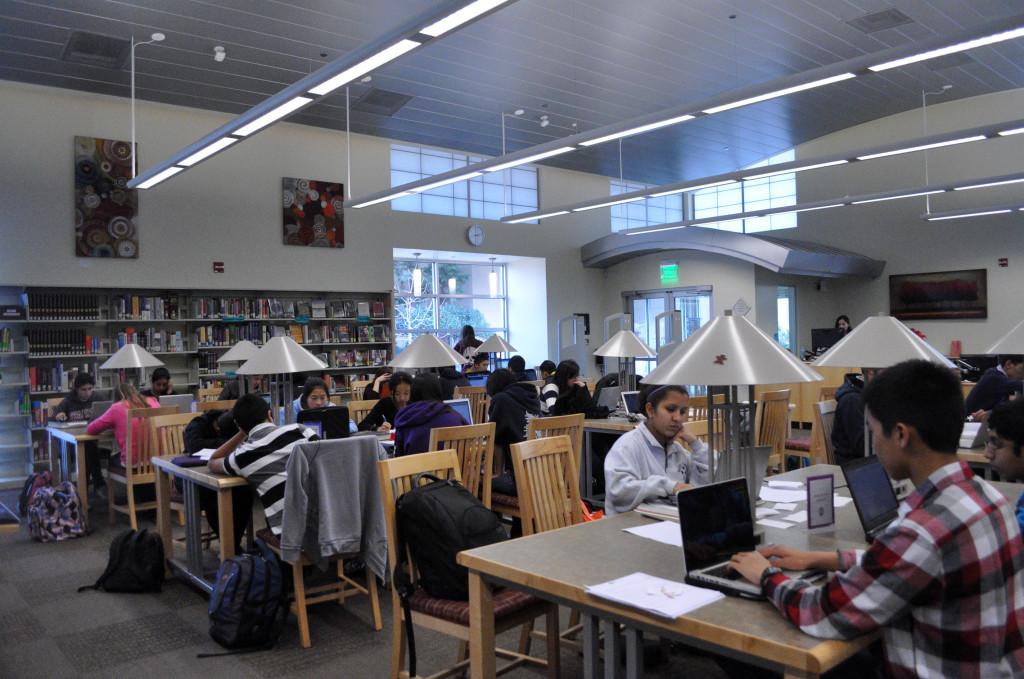The library will be continuing its biannual “Dead Quiet Study Zone” policy to accommodate students studying for winter finals from Thursday, December 13 to the Tuesday of the following week.
Instated five years ago, this policy was originally designed so that students could have a place to study quietly during the end of the semester exams, usually weighted 15 or 20 percent of their overall grade. This policy was implemented after head librarian Lauri Vaughan noted that when the library was in Main, she noticed loud talking outside every time the door opened which would disrupt students.
The policy adopts an even quieter study environment than before; librarians will ask students to leave if they talk at all, constantly monitor students, and potentially sit in the back room to request noisier students to depart if necessary.
“We have noticed that the back room tends to get louder, and if we are sitting amongst them, it reminds them to lower their voices,” librarian Meredith Cranston said.
This year, the study zone policy will start on Wednesday, a day before finals, unlike last year when it started on the Monday of the first final. Because finals start in the middle of the week as opposed to the beginning, the librarians wanted to give students an extra day to study for the Thursday finals.
Some future changes that the librarians hope to adopt for spring finals include a potential crafts table so that students can take a study break or a bucket of granola bars outside the library for all students to snack on.
“We all hate being the person to shush people,” Vaughan said. “We don’t want to be the bad guy, but we made the decision to be a defender for a student who wants silence.”
Students have had mixed responses to the policy. Freshman Helena Dworak supports the policy, although it does not affect her much.
“I don’t really study at school [during finals week], but I think it’s good that people have a place to seriously do work.”
Junior Christine Lee believes that some form of collaboration should be possible in the library.
“I like clarifying concepts by asking others for help, [but] I think it’s really hard to find a place to study quietly with someone on campus,” she said.
Vaughan said that though the librarians do support group study, the noise level frequently escalates quickly. She thinks that by having smaller collaborative rooms for four to six people each, the noise level will be more manageable, but she does not plan on making this change in the near future because of space limitations.


















![“[Building nerf blasters] became this outlet of creativity for me that hasn't been matched by anything else. The process [of] making a build complete to your desire is such a painstakingly difficult process, but I've had to learn from [the skills needed from] soldering to proper painting. There's so many different options for everything, if you think about it, it exists. The best part is [that] if it doesn't exist, you can build it yourself," Ishaan Parate said.](https://harkeraquila.com/wp-content/uploads/2022/08/DSC_8149-900x604.jpg)




![“When I came into high school, I was ready to be a follower. But DECA was a game changer for me. It helped me overcome my fear of public speaking, and it's played such a major role in who I've become today. To be able to successfully lead a chapter of 150 students, an officer team and be one of the upperclassmen I once really admired is something I'm [really] proud of,” Anvitha Tummala ('21) said.](https://harkeraquila.com/wp-content/uploads/2021/07/Screen-Shot-2021-07-25-at-9.50.05-AM-900x594.png)







![“I think getting up in the morning and having a sense of purpose [is exciting]. I think without a certain amount of drive, life is kind of obsolete and mundane, and I think having that every single day is what makes each day unique and kind of makes life exciting,” Neymika Jain (12) said.](https://harkeraquila.com/wp-content/uploads/2017/06/Screen-Shot-2017-06-03-at-4.54.16-PM.png)








![“My slogan is ‘slow feet, don’t eat, and I’m hungry.’ You need to run fast to get where you are–you aren't going to get those championships if you aren't fast,” Angel Cervantes (12) said. “I want to do well in school on my tests and in track and win championships for my team. I live by that, [and] I can do that anywhere: in the classroom or on the field.”](https://harkeraquila.com/wp-content/uploads/2018/06/DSC5146-900x601.jpg)
![“[Volleyball has] taught me how to fall correctly, and another thing it taught is that you don’t have to be the best at something to be good at it. If you just hit the ball in a smart way, then it still scores points and you’re good at it. You could be a background player and still make a much bigger impact on the team than you would think,” Anya Gert (’20) said.](https://harkeraquila.com/wp-content/uploads/2020/06/AnnaGert_JinTuan_HoHPhotoEdited-600x900.jpeg)

![“I'm not nearly there yet, but [my confidence has] definitely been getting better since I was pretty shy and timid coming into Harker my freshman year. I know that there's a lot of people that are really confident in what they do, and I really admire them. Everyone's so driven and that has really pushed me to kind of try to find my own place in high school and be more confident,” Alyssa Huang (’20) said.](https://harkeraquila.com/wp-content/uploads/2020/06/AlyssaHuang_EmilyChen_HoHPhoto-900x749.jpeg)







![LALC Vice President of External Affairs Raeanne Li (11) explains the International Phonetic Alphabet to attendees. "We decided to have more fun topics this year instead of just talking about the same things every year so our older members can also [enjoy],” Raeanne said.](https://harkeraquila.com/wp-content/uploads/2025/10/DSC_4627-1200x795.jpg)







